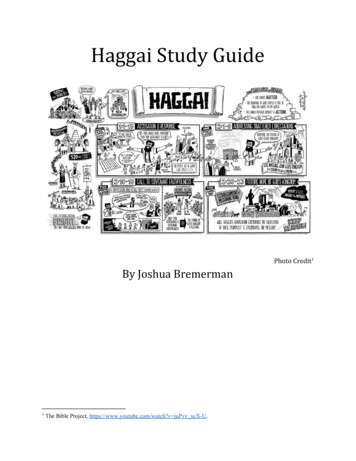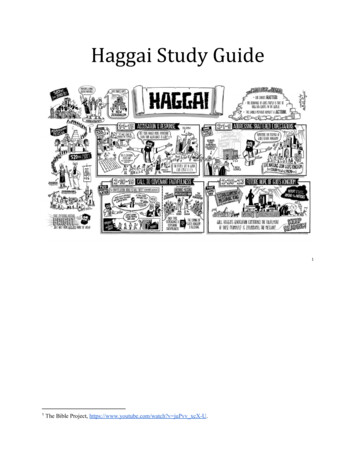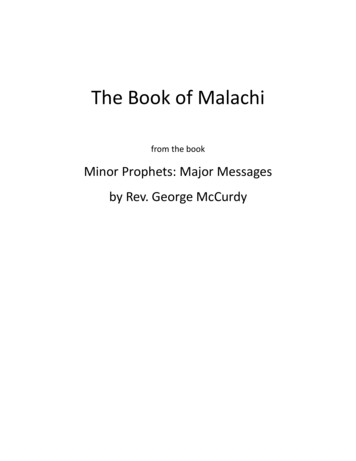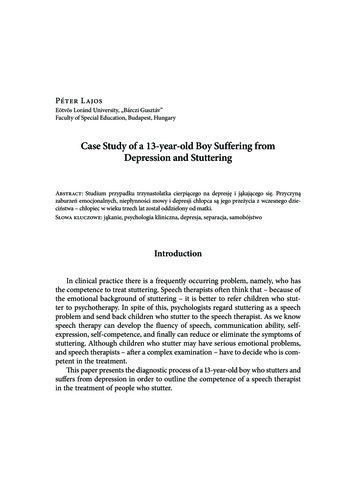
Transcription
Haggai Study GuidePhoto Credit1By Joshua Bremerman1 The Bible Project, https://www.youtube.com/watch?v juPvv xcX-U .
1Table of ContentsI.II.III.Student’s Guide Introduction1. Welcome2. Text-Based Bible Study Study Guide1. Week 1: Haggai 1:1–22. Week 2: Haggai 1:3–153. Week 3: Haggai 2:1–94. Week 4: Haggai 2:10–195. Week 5: Haggai 2:20–23 Summary Outline w/Main Point Sentences Outline of the Book of HaggaiLeader’s Guide You’ve Got This! Study QuestionsHebrew Supporting Materials23471115192223242633
2Welcome to Our Haggai Bible StudyWelcome to this five week Bible study through the book of Haggai! I am excited for you asyou embark on this journey with me. Why? Well, I have three major reasons for joy.First, our God has spoken to us through his prophets, and we get to sit at their feet throughGod’s grace in recording all of his words for us in the Bible. I look forward to unpackingHaggai together: the lows of spiritual unfaithfulness, the grace of repentance, and thepower of God’s presence. This 2,500 year old message still resonates powerfully today!Second, we will approach the next five weeks through the method of text-based Bible study.If you’ve ever watched a child taste ice cream for the first time, you know the pure joy wecan have in seeing someone else find the joy of discovery. Text-based study does not meanreading someone else’s comments on the Bible, it means jumping into the elevator,descending into the mine shaft, and digging out those diamonds yourselves. I can’t wait tosee the precious jewels you uncover as you slowly process and digest the book of Haggai.Don’t worry, though, you will have a guide and some tools to help along the way!Finally, Ilove how God relates to his people as we study his words for us. Christians workhard to handle God’s word rightly using our God-given capacities to reason. As 2 Timothy2:15 says, “Do your best to present yourself to God as one approved , a worker who has noneed to be ashamed, rightly handling the word of truth .” We work hard, and we do thisconfidently because we trust the Holy Spirit to illuminate our minds and hearts tounderstand, adopt, and apply the Scriptures well. As Paul encouraged Timothy in 2Timothy 2:7, “Think over what I say, for the Lord will give you understanding ineverything .”Brothers and sisters, joy awaits you as you jump into these pages. Take a moment beforeyou continue to ask God for help over the next five weeks to study his word, to feel what hewould have you feel as you understand it, and to act appropriately in light of it. Here aresome passages to kick-start your time with the Lord: Psalm 119:18 “ Open my eyes , that I may behold wondrous things out of your law.”, Psalm 119: 34 “ Give me understanding , that I may keep your law and observe it withmy whole heart.” Luke 24:44–45 “Then he said to them, “These are my words that I spoke to youwhile I was still with you, that everything written about me in the Law of Moses andthe Prophets and the Psalms must be fulfilled.” Then he opened their minds tounderstand the Scriptures .”I am excited for you and praying these same requests to God on your behalf.Josh Bremerman
3Text-Based Bible StudySo how exactly will the study work. Let’s take a look at how each week of study will work.We want our time in groups to be as helpful as possible, so each person should strive theirhardest to come to group time prepared and ready to engage.Before beginning week #1, please read the book of Haggai five times. I suggest doing so inmultiple English translations by accessing them from a website like Biblegateway.com orBiblearc.com. Here are five to try out (in this order): NASB, ESV, NIV, CSB, NLT. If possible,read it without the headings or the verse numbers (you can change the settings on either ofthe suggested websites). We will use the NLT for our study.Next, each week we will work through a different section of Scripture. I suggest followingthese study steps each week:1. Read the assigned passage five times using the five versions with which you beganthe study group.2. Pray for God’s help as you study to help you understand, adopt, and apply his word.3. Work through the passage in the notebook using the assigned prompts.4. Sum up the message of each section in one summary sentence.5. Answer the study questions.6. Adjust your summary as needed.7. Share what you have been studying with a friend (someone in or even outside thegroup) before the group meets.Remember, you will be tempted at times to go to someone else for the “correct” answersbefore wrestling with the passage yourself. When you feel that way, remember that norunner wins a gold medal by skipping out on training three months before the race. Itmight be hard at times, but it will be worth it!
4Week 1: Haggai 1:1–2Read the assigned passage five times using the five versions with which you beganthe study group (Suggested: NASB, ESV, NIV, CSB, NLT).Pray for God’s help as you study to help you understand, adopt, and apply his word.1 On August 29 of the second year of King Darius’s reign, the Lord gave a messagethrough the prophet Haggai to Zerubbabel son of Shealtiel, governor of Judah, and to Jeshuason of Jehozadak, the high priest.2 “This is what the Lord of Heaven’s Armies says: The people are saying, ‘The time hasnot yet come to rebuild the house of the Lord.’”Work through the passage in the notebook.21. Draw a lightbulb over anything that stood out to you from this section.2. Draw a question mark over anything that leaves you wondering.3. Draw an arrow over anything you can apply to your life.4. Draw a cross anywhere you see a connection to Jesus (the need for Jesus, a promiseof Jesus’s coming, forgiveness, etc.).5. Draw a dialogue bubble over anything you could share with a friend.6. Put a clock over any references to time.7. Put a triangle around any references to God.8. Double underline any commands.9. Circle the conjunctions.10. Underline any statements of fact (e.g. the word of the LORD came).11. Check for cross-references (Ezra 1:1–11; Ezra 3:8–5:2; Ezra 6:13–18; Psalm132:3–5). These prompts are modified from several different study methods. You can check some of them out if you’d like touse them in your own study: The Swedish Bible Study ; Inductive BibleStudy Method le-study/); Precepts Bible Study(https://www.precept.org/about/); -raymond/one-to-one-bible-reading/).2
5Sum up the message of this section in one summary sentence.Study Questions1. What stuck out to you most from this section of Haggai?2. How do the cross-references better help you understand the history behind the book ofHaggai? How does the book of Haggai fit into the rest of the Bible?“[The book of Haggai] is set in the second year of King Darius of Persia, 520 B.C.E.”33. What is Zerubbabel’s job among the people? What is Joshua’s job among the people?What is Haggai’s job among the people? How does Haggai’s role influence the genre of thisbook?4. Who is “the Lord of heaven’s armies” in verse 2 (preview Haggai 2:4 and check out Psalm24:10)?“[Haggai] gave this message from the LORD of hosts, a title for God that is used 14 timesin this short book . identifying the God of Israel as the commander of the armies ofheaven, an important reminder when Israel had no earthly army.”4 Marvin A. Sweeney, The Twelve Prophets, Vol. 2, Berit Olam (Collegeville: The Liturgical Press, 2000), 529. Michael Rydelnik, “Haggai” in The Moody Bible Commentary, eds. Michael Rydelnik and Michael Vanlaningham(Chicago: Moody Publishers, 2014), 1407.34
65. What does God accuse the people of doing in verse 2?6. How does Psalm 132:3–5 help us understand the seriousness of God’s accusation?7. In what ways have you found laziness or inaction creeping into your spiritual life? Howhave you experienced a lack of zeal for honoring God?Adjust your summary as needed.Challenge: Share what you have been studying with a friend (someone in or evenoutside the group) before the group meets.
7Week 2: Haggai 1:3–15Read the assigned passage five times using the five versions with which you beganthe study group (Suggested: NASB, ESV, NIV, CSB, NLT).Pray for God’s help as you study to help you understand, adopt, and apply his word.3 Then the Lord sent this message through the prophet Haggai: 4 “Why are you livingin luxurious houses while my house lies in ruins? 5 This is what the Lord of Heaven’s Armiessays: Look at what’s happening to you! 6 You have planted much but harvest little. You eat butare not satisfied. You drink but are still thirsty. You put on clothes but cannot keep warm.Your wages disappear as though you were putting them in pockets filled with holes!7 “This is what the Lord of Heaven’s Armies says: Look at what’s happening to you! 8Now go up into the hills, bring down timber, and rebuild my house. Then I will take pleasure init and be honored, says the Lord. 9 You hoped for rich harvests, but they were poor. And whenyou brought your harvest home, I blew it away. Why? Because my house lies in ruins, says theLord of Heaven’s Armies, while all of you are busy building your own fine houses. 10 It’sbecause of you that the heavens withhold the dew and the earth produces no crops. 11 I havecalled for a drought on your fields and hills—a drought to wither the grain and grapes andolive trees and all your other crops, a drought to starve you and your livestock and to ruineverything you have worked so hard to get.”12 Then Zerubbabel son of Shealtiel, and Jeshua son of Jehozadak, the high priest, andthe whole remnant of God’s people began to obey the message from the Lord their God. Whenthey heard the words of the prophet Haggai, whom the Lord their God had sent, the people
8feared the Lord. 13 Then Haggai, the Lord’s messenger, gave the people this message from theLord: “I am with you, says the Lord!”14 So the Lord sparked the enthusiasm of Zerubbabel son of Shealtiel, governor ofJudah, and the enthusiasm of Jeshua son of Jehozadak, the high priest, and the enthusiasm ofthe whole remnant of God’s people. They began to work on the house of their God, the Lord ofHeaven’s Armies, 15 on September 21 of the second year of King Darius’s reign.Work through the passage in the notebook.1. Draw a lightbulb over anything that stood out to you from this section.2. Draw a question mark over anything that leaves you wondering.3. Draw an arrow over anything you can apply to your life.4. Draw a cross anywhere you see a connection to Jesus (the need for Jesus, a promiseof Jesus’s coming, forgiveness, etc.).5. Draw a dialogue bubble over anything you could share with a friend.6. Put a clock over any references to time.7. Put a triangle around any references to God.8. Double underline any commands.9. Circle the conjunctions.10. Underline any statements of fact (e.g. the word of the LORD came).11. Check for cross-references (Isaiah 64:11; Micah 6:15; 1 Kings 8:35; Deuteronomy28:22–40).Sum up the message of this section in one summary sentence.Study Questions1. What stuck out to you most from this section of Haggai?
92. How does God accuse the people in verse 4?3. What are the things God tells the people to look at?4. How does God want his people to respond in verses 7 and 8?5. What was involved in the people’s repentance? Consider aspects of the mind, the heart,and the actions.6. How in your life have seen a need to “fear God” more?“The word feared, in many contexts such as this one, is best understood as wholesomerespect. God does not desire that people be terrified of him, but rather that theyappropriately revere him (see Exod 20:20).”57. What sins, either active or passive, do you need to repent of after reading these verses?Laurie Braaten and Jim Edlin, Nahum–Malachi: A Commentary in the Wesleyan Tradition (Kansas City: BeaconHill Press, 2019), 238.5
108. Does this passage give us any reason to believe that some of our hardships are due to sin(think of verse 9 in particular)? How do we process whether or not God is “disciplining” usfor our actions?“Experiences of hardship should always become opportunities for spiritual reflection,turning us heavenward to ask hard questions . If under the searchlight of God’s Wordwe have need of repentance, we should turn from our sins and walk in a way consistentwith this penitence.”69. What practical actions can you take in light of this passage to move away from sin andtoward righteousness?Adjust your summary as needed.Challenge: Share what you have been studying with a friend (someone in or evenoutside the group) before the group meets.6 Mark J. Boda, Haggai, Zechariah , NIVAC, ed. Terry Muck (Grand Rapids: Zondervan, 2004), 101.
11Week 3: Haggai 2:1–9Read the assigned passage five times using the five versions with which you beganthe study group (Suggested: NASB, ESV, NIV, CSB, NLT).Pray for God’s help as you study to help you understand, adopt, and apply his word.1 Then on October 17 of that same year, the Lord sent another message through theprophet Haggai. 2 “Say this to Zerubbabel son of Shealtiel, governor of Judah, and to Jeshuason of Jehozadak, the high priest, and to the remnant of God’s people there in the land: 3 ‘Doesanyone remember this house—this Temple—in its former splendor? How, in comparison, doesit look to you now? It must seem like nothing at all! 4 But now the Lord says: Be strong,Zerubbabel. Be strong, Jeshua son of Jehozadak, the high priest. Be strong, all you people stillleft in the land. And now get to work, for I am with you, says the Lord of Heaven’s Armies. 5 MySpirit remains among you, just as I promised when you came out of Egypt. So do not be afraid.’6 “For this is what the Lord of Heaven’s Armies says: In just a little while I will againshake the heavens and the earth, the oceans and the dry land. 7 I will shake all the nations,and the treasures of all the nations will be brought to this Temple. I will fill this place withglory, says the Lord of Heaven’s Armies. 8 The silver is mine, and the gold is mine, says theLord of Heaven’s Armies. 9 The future glory of this Temple will be greater than its past glory,says the Lord of Heaven’s Armies. And in this place I will bring peace. I, the Lord of Heaven’sArmies, have spoken!”Work through the passage in the notebook.1. Draw a lightbulb over anything that stood out to you from this section.2. Draw a question mark over anything that leaves you wondering.3. Draw an arrow over anything you can apply to your life.4. Draw a cross anywhere you see a connection to Jesus (the need for Jesus, a promiseof Jesus’s coming, forgiveness, etc.).
125. Draw a dialogue bubble over anything you could share with a friend.6. Put a clock over any references to time.7. Put a triangle around any references to God.8. Double underline any commands.9. Circle the conjunctions.10. Underline any statements of fact (e.g. the word of the LORD came).11. Check for cross-references (Zech 8:9; John 1:14–18; 1 Corinthians 3:16–17; 1Corinthians 6:12–20).Sum up the message of this section in one summary sentence.Study Questions1. What stuck out to you most from this section of Haggai?2. How much time has passed since the people started work on the temple?3. How does the state of the new temple compare with the old? How do the peoplerespond?4. What is the significance of God’s presence in verses 4 and 5?
135. Compare the reference to “fear” in verse 5 to the reference in chapter 1? What significantdifferences are there between the two references?“As a result of his presence, God stirred the hearts of his people enabling them to do hiswork in this world. Obedience and the empowering presence of God go hand in hand.”76. What does God promise in verses 7 to 9?”Abiding divine presence and universal acknowledgment of Yahweh will grace thistemple.”87. How do passages like John 1:14–18 and 1 Corinthians 3:16–17 and 6:12–20 influenceour understanding of the temple of God?8. How should we feel about being made in the image of God, who is Jesus Christ, and howwe reflect his image by embodying the Holy Spirit just like the temple did in the OldTestament?9. How should we be encouraged by the message of this passage?78 Braaten and Edlin, 240. Paul R. House, Old Testament Theology (Downers Grove: IVP Academic, 1998), 385.
1410. How should this passage challenge us to live? What are areas where we don’t expect theglory of the Lord and compare it to a past “greater” glory? How does our part in the“greater glory” motivate us to preach the gospel?Adjust your summary as needed.Challenge: Share what you have been studying with a friend (someone in or evenoutside the group) before the group meets.
15Week 4: Haggai 2:10–19Read the assigned passage five times using the five versions with which you beganthe study group (Suggested: NASB, ESV, NIV, CSB, NLT).Pray for God’s help as you study to help you understand, adopt, and apply his word.10 On December 18 of the second year of King Darius’s reign, the Lord sent thismessage to the prophet Haggai: 11 “This is what the Lord of Heaven’s Armies says. Ask thepriests this question about the law: 12 ‘If one of you is carrying some meat from a holysacrifice in his robes and his robe happens to brush against some bread or stew, wine or oliveoil, or any other kind of food, will it also become holy?’”The priests replied, “No.”13 Then Haggai asked, “If someone becomes ceremonially unclean by touching a deadperson and then touches any of these foods, will the food be defiled?”And the priests answered, “Yes.”14 Then Haggai responded, “That is how it is with this people and this nation, says theLord. Everything they do and everything they offer is defiled by their sin. 15 Look at what washappening to you before you began to lay the foundation of the Lord’s Temple. 16 When youhoped for a twenty-bushel crop, you harvested only ten. When you expected to draw fiftygallons from the winepress, you found only twenty. 17 I sent blight and mildew and hail todestroy everything you worked so hard to produce. Even so, you refused to return to me, saysthe Lord.18 “Think about this eighteenth day of December, the day when the foundation of theLord’s Temple was laid. Think carefully. 19 I am giving you a promise now while the seed is
16still in the barn. You have not yet harvested your grain, and your grapevines, fig trees,pomegranates, and olive trees have not yet produced their crops. But from this day onward Iwill bless you.”Work through the passage in the notebook.1. Draw a lightbulb over anything that stood out to you from this section.2. Draw a question mark over anything that leaves you wondering.3. Draw an arrow over anything you can apply to your life.4. Draw a cross anywhere you see a connection to Jesus (the need for Jesus, a promiseof Jesus’s coming, forgiveness, etc.).5. Draw a dialogue bubble over anything you could share with a friend.6. Put a clock over any references to time.7. Put a triangle around any references to God.8. Double underline any commands.9. Circle the conjunctions.10. Underline any statements of fact (e.g. the word of the LORD came).11. Check for cross-references (Leviticus 10:10–11; Amos 4:9).Sum up the message of this section in one summary sentence.Study Questions1. What stuck out to you most from this section of Haggai?2. Check the time! How does this passage compare to the other Haggai messages thus far interms of timing?
173. Haggai gives an extended illustration in verses 11–14. What is the main point of hisillustration?“Because of their defilement, they had been wasting their time offering sacrifices on theLord’s altar: until their status was changed, nothing they brought to him could beaccepted.”94. How would you paraphrase the content of Haggai’s “look at what” statement in verse 15?5. How would you paraphrase the content of Haggai’s “think carefully” statement in verse18?6. How should we feel in light of this passage? How should we feel about ourselves, andhow should we feel about God?7. We have more “light” and a new “lens” on this side of Christ’s coming. How do weunderstand God’s blessing for an “unclean” people in the new covenant?“Holiness is not transmitted to us by simple contact any more than it was in Haggai’s day.Growing up in a Christian home and attending a vibrant Christian church will not makeanyone a Christian any more than spending time at a marina will make someone a yacht.”10 Iain M. Duguid and Matthew P. Harmon, Zephaniah, Haggai, Malachi , REC (Philipsburg: P&R Publishing, 2018),76–77.10 Ibid., 80.9
188. How does a “blessed” people respond to the God who blesses them? How can youincorporate these responses consistently into day to day life? Suggestion: As a group, singJoy to the World in order to celebrate God’s radical provision for an unworthy people.11Adjust your summary as needed.Challenge: Share what you have been studying with a friend (someone in or evenoutside the group) before the group meets.11 Ibid., 79.
19Week 5: Haggai 2:20–23Read the assigned passage five times using the five versions with which you beganthe study group (Suggested: NASB, ESV, NIV, CSB, NLT).Pray for God’s help as you study to help you understand, adopt, and apply his word.20 On that same day, December 18, the Lord sent this second message to Haggai: 21“Tell Zerubbabel, the governor of Judah, that I am about to shake the heavens and the earth.22 I will overthrow royal thrones and destroy the power of foreign kingdoms. I will overturntheir chariots and riders. The horses will fall, and their riders will kill each other.23 “But when this happens, says the Lord of Heaven’s Armies, I will honor you,Zerubbabel son of Shealtiel, my servant. I will make you like a signet ring on my finger, saysthe Lord, for I have chosen you. I, the Lord of Heaven’s Armies, have spoken!”Work through the passage in the notebook.1. Draw a lightbulb over anything that stood out to you from this section.2. Draw a question mark over anything that leaves you wondering.3. Draw an arrow over anything you can apply to your life.4. Draw a cross anywhere you see a connection to Jesus (the need for Jesus, a promiseof Jesus’s coming, forgiveness, etc.).5. Draw a dialogue bubble over anything you could share with a friend.6. Put a clock over any references to time.7. Put a triangle around any references to God.8. Double underline any commands.9. Circle the conjunctions.10. Underline any statements of fact (e.g. the word of the LORD came).11. Check for cross-references (Daniel 2:44; Jeremiah 2:24).Sum up the message of this section in one summary sentence.
20Study Questions1. What stuck out to you most from this section of Haggai?2. You know this by now :) How does this passage compare to the others regarding timing?3. How does the audience of this message differ from the other messages? Why does thismatter?4. Some of the words are similar to the message in 2:1–9. How does the addition of“overthrow royal thrones,” along with the Daniel 2:44 cross-reference, influence thismessage?5. What do you make of the Jeremiah 2:24–25 cross-reference, and what is the significanceof the signet ring?Signet Ring: “YHWH’s designation of Zerubbabel as “signet” demonstrates thatZerubbabel would rule as YHWH’s designated monarch.”12Fact: Zerubbabel is Jehoiachin’s grandson. Jehoiachin was the king of Judah when theBabylonians came and captured the people. “Zerubbabel of the line of David was only aPersian governor of a tiny community. But it would not always be that way. Yahweh wasgoing to shake the nations.”13 Sweeney, 554. Ralph L. Smith, Micah–Malachi, WBC, eds. David A. Hubbard and Glenn W. Barker (Grand Rapids: Zondervan,1984), 163.1213
216. If Zerubbabel never ruled as God’s king on earth, did the prophecy of Haggai fail? Howdoes Jesus change things?7. How should this passage encourage our hearts in God’s sovereign plan over all things?8. How can we live with more hope in the prophecies of the second coming of Christ byreflecting on these promises of his first coming?Adjust your summary as needed.Challenge: Share what you have been studying with a friend (someone in or evenoutside the group) before the group meets.
22Summary Outline with Main Point Sentences:PassageMain PointHaggai 1:1–2Haggai 1:3–15Haggai 2:1–9Haggai 2:10–19Haggai 2:20–23Using your theme sentences, sum up the message of Haggai in one sentence:From the Teachers:PassageMain PointHaggai 1:1–2God despises when his people lack devotion to him.Haggai 1:3–15God desires for sinners to repent of their lack of devotion and turn tohim with their mind, heart, and actions.Haggai 2:1–9The people feel insignificant, but God promises a greater glory tocome based on his presence and the riches of the nations.Haggai 2:10–19The people remain unclean in their sin, so they need God to take theinitiative in blessing them and making them holy, which he promisesto do.Haggai 2:20–23Though Persia rules over God’s people for now, God will raise up aneternal king from the tribe of Judah to overthrow the nations andestablish God’s kingdom.Here is our attempt at a one sentence summary (don’t worry if our words don’t line up theexact same, but consider the themes we draw out): Turn back to God, for God will soon sendhis eternal king to rule over his glorious temple made out of his forgiven and holy people.
23Outline for the book of HaggaiNote—Refer to this after you have finished the study or on your second study throughHaggai! Remember not to rob yourself of the joy of discovery.I.II.III.IV.Message One: Repent with your mind, heart, and actions by fearing Yahwehand building his house (Haggai 1:1–15).A. Setting the stage: The people do not desire to build the temple (Haggai1:1–2).B. God explains that the people have been languishing because of their lack ofdevotion to rebuilding God’s house (Haggai 1:3–6).C. God calls for a repentance of mind, heart, and actions (Haggai 1:7–8).D. God again reminds the people of the lack of blessing they have lived underdue to disobedience and spiritual malaise (Haggai 1:9–12).E. The people repent! God empowers the people to start working on the temple(Haggai 1:13–15).Message Two: God promises a greater glory to come (Haggai 2:1–9).A. Those who remember the old temple weep at the present state of God’shouse (Haggai 2:1–3).B. God calls the people to be strong (Haggai 2:4a).1. They can be strong because God is with them (Haggai 2:4b–5).2. They can be strong because God is up to something (Haggai 2:6).3. They can be strong because God will bring the glory of the nation intothe new temple (Haggai 2:7–9).Message Three: God will make his unclean people holy again (Haggai2:10–19).A. An illustration: holy food cannot make other things holy, but unclean peoplecan make others unclean (Haggai 2:10–14).B. Consider this: because of your uncleanness and disobedience, you have beendisciplined and suffering hardship (Haggai 2:15–17).C. Consider this: though you have experienced discipline, and though you stillremain unclean, God will bless you (Haggai 2:18–19).Message Four: Take heart, Zerubbabel, I will raise you up as king over thenations (Haggai 2:20–23).
24Leader’s Guide: You’ve got this!Thank you SO much for agreeing to lead a small group through the book of Haggai with us.By God’s grace, you will play an integral role in the success of this small group. Don’t beafraid, though, because the Lord of hosts is on your side!In this leader’s guide you will find a couple of different components. First, you will find thestudy questions with possible prompts for answers. This should give an insight into thetypes of questions or answers we hope the people will be drawing out as we have spenttime studying this book.Second, you will find an accompanying diagram of the book of Haggai in the originallanguage, along with a formal-equivalence (mostly wooden) translation. As you observethis diagram, you will see some of the breakdowns and how the text was originally worded.We choose the NLT as a good option for young adults as it smoothes some of the roughedges of the text’s wordings, but the closer we get to the original, oftentimes the deeperinsights we will find. We hope you will find this breakdown helpful.Finally, a quick word on leading small groups. In the same way that we hope to draw outmost of the insights from the text through text-based study, we also want to allow thediscussion to feel less like a lecture or Q/A, and more like a true discussion. Here are somethoughts for you:1. The questions are structured in the format of launching questions to get theconversation going, head questions related to exactly what we see in the text, heartlevel questions to get toward the message intended in the text, and hand questionsintended to help us leave the group acting. Identify what the goal is behind eachquestion and work for holistic discussions each week.2. Feel free to encourage certain people to talk more or less. Within a week you willknow who are your talkers, and who are not your talkers. Take a moment before thesecond group to individually encourage some people casually to talk more. Wewould wait until week 3 to confront someone who is dominating the group.3. Learn from the rest of your group members! Don’t be surprised when someone pullssomething out that you haven’t seen before. Rejoice that God gave them eyes to seesomething that can help you moving forward.4. Don’t feel the need to track down every nagging question. The guide should help youmove through each passage and address the most pertinent details. If a question istaking more than five minutes of discussion, defer it until after the group meetingends. If you feel this is a big question for the entire group, then certainly use yourwisdom to linger and deal with it.
255. The first question for each week is intended to lau
Text-Based Bible Study 3 Study Guide 1. Week 1: Haggai 1:1–2 4 2. Week 2: Haggai 1:3–15 7 3. Week 3: Haggai 2:1–9 11 4. Week 4: Haggai 2:10–19 15 5. Week 5: Haggai 2:20–23 19 Summary Outline w/Main Po










